To find the lot code, look in the lower right corner on the back of the bag.

To find the lot code, look in the lower right corner on the back of the bag.

The headline in the news article caught my attention: “Half of the dogs in Britain will suffer painful and early deaths because owners let them get fat”. I read through looking for anything that was new about fat animals, and, while there really is nothing new, the headline IS correct and obesity in pets, just like obesity in humans, can cause major health problems.
The stats from this article are grim:
“Vet Sean Wensley said: ‘Overweight pets are less mobile, less willing to play and more likely to develop a serious health condition.
‘Ultimately, owners control their pets’ diets and exercise.’
The charity has surveyed the weight of dogs each year since 2006. Over that time, the proportion of obese pets has shot up from 21 per cent to 35 per cent.
If the trend continues, the PDSA estimates that nearly half of British dogs will be overweight by 2013 – putting them at risk of heart disease, diabetes, arthritis and an early grave. “
So the trick is – what can you do if you’ve let your pet get fat? You have to do the same things you’d do if you let yourself get fat. Simple really.
1. Eat healthier
2. Eat less
3. Exercise more
4. Make sure you are getting enough vitamins and minerals to support your system as you lose weight.
No matter what anyone tells you…losing weight IS work. It’s work for you. It’s work for your pet. But instead of looking forward to the project and doing it together.
In the end you’ll both enjoy your lives much better and longer.
Linda

A man who lives at Lake Conroe, (50 miles north of Houston) saw a ball bouncing around kind of strange in the lake and went to investigate.
It turned out to be a flathead catfish that had apparently tried to swallow a basketball which became stuck in its mouth!!
The fish was totally exhausted from trying to dive, but unable to because the ball would always bring him back up to the surface.
The man tried numerous times to get the ball out but was unsuccessful in doing so.
He finally had his wife cut the ball in order to deflate it and release the hungry catfish.
You probably wouldn’t have believed this,
if you hadn’t seen the following pictures:

The strange ball bobbing in the lake caught the man’s attention
———————————————————–
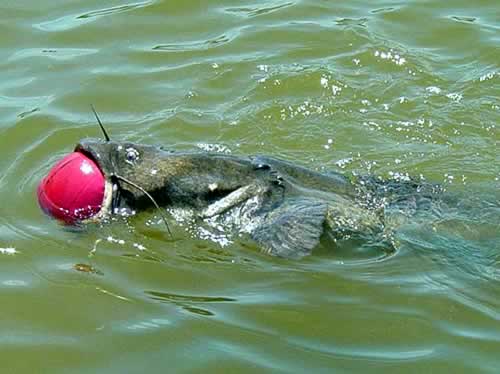
When he got closer he could see it was a catfish who’d managed to get its jaws around a basketball
————————————————————————-
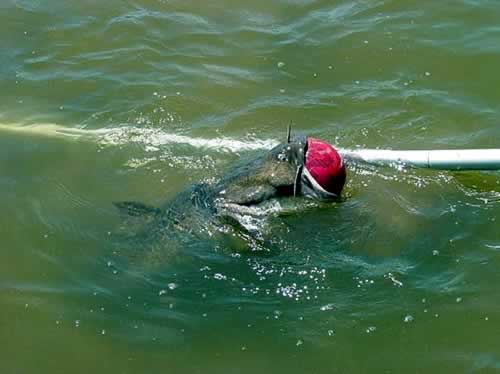
He used a pole to guide the fish closer to try and get the ball out but it was too firmly wedged in.
————————————————————————-
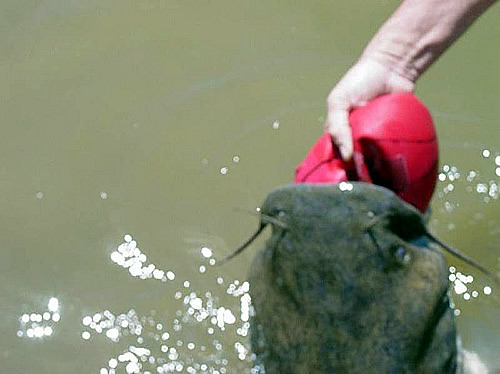
Finally his wife cut the ball to let the air out
————————————————————————-
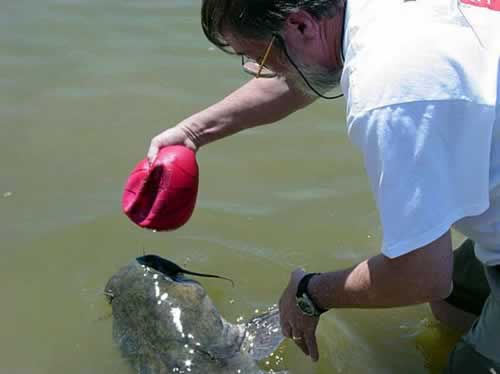
and with a couple of tugs, the ball came out and the catfish was free to swim away
and live happily ever after .
——————————————————————–
The end
Sign up for Daily Paws and receive a free gift from VetLocator.com
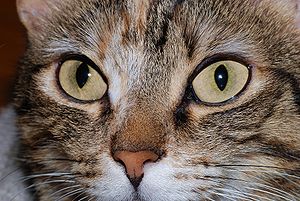
FORT COLLINS – Colorado State University veterinarians are looking for cats with chronic kidney disease to enroll in five current studies. To qualify, cats must already have been diagnosed with chronic kidney disease, also known as renal failure, by a veterinarian.
Several of the studies carry monetary benefits for pet owners.
The studies:
– A study looking at whether fatty acids in the feline diet are related to antioxidant and anti-inflammatory effects that could protect a cat’s kidneys. This study is open to qualifying felines who have stable chronic kidney failure, defined as a period of no change for three months. Cats in the study receive free complete blood count, blood chemistry tests, urinalysis and culture, urine protein, creatinine ratio, thyroid level and blood pressure tests, all valued at $150. Test results can be shared with veterinarians outside of CSU. Cats with some additional conditions are excluded from the study.
– Cats with kidney disease often have nausea and don’t eat. This study looks at the potential of the drug mirtazapine to improve the quality of life for cats with stable kidney disease. Mirtazapine stimulates the appetite and has anti-nausea properties. Cats in the study will be given either a placebo or the stimulant for three weeks and then crossover to the other group for an additional three weeks. The study includes three free but required veterinary visits and lab work, and six months of free Purina kidney diet cat food. Owners also will have access to the appetite stimulant for a period of time after the study. Cats with some health conditions are excluded from this study. Cats from anywhere in the United States can enroll in the study with their veterinarian’s participation.
– Anemic cats with kidney disease can enroll in a study that provides them with injections of a product that may improve the anemia. Kidneys produce a natural substance called erythropoietin that tells the bone marrow to produce red blood cells. Cats in kidney failure can lose their ability to form erythropoietin, causing anemia. Cats with anemia in the study will receive a feline-specific injection of erythropoietin and the impact will be measured weekly for a one-month period. Cats must be able to come to CSU for the treatment and following exams. Exam fees will be covered, along with weekly blood work, for the duration of the study. The study is limited to 18 cats, and a $600 stipend will be given to those enrolled.
CSU’s Veterinary Teaching Hospital also is offering free private cremation services for cats who have died from chronic kidney failure. CSU veterinarians would like to obtain post-mortem autopsy kidney samples to further study if a decrease in the ability of kidney cells to repair themselves is related to why kidney disease occurs in cats. The ashes of the deceased cat would be returned to owners within about a week’s time.
For more information about any of these studies, contact Dr. Jessica Quimby at jquimby@colostate.edu or 970-297-4410.
Quimby is the Morris Animal Foundation Amanda Feline Fellow.
 FOR IMMEDIATE RELEASE – July 15, 2010 – Buffalo, NY – Feline’s Pride is expanding its July 1, 2010 voluntary recall of Feline’s Pride Raw food with ground bone for cats and kittens, Natural Chicken Formula, Net Wt. 2.5 lbs. (1.13 kg., 40 oz.) produced on 6/10/10 to include the product produced on 6/21/10, because it may be contaminated with Salmonella. People handling raw pet food can become infected with Salmonella, especially if they have not thoroughly washed their hands after having contact with the raw pet food or any surfaces exposed to the product.
FOR IMMEDIATE RELEASE – July 15, 2010 – Buffalo, NY – Feline’s Pride is expanding its July 1, 2010 voluntary recall of Feline’s Pride Raw food with ground bone for cats and kittens, Natural Chicken Formula, Net Wt. 2.5 lbs. (1.13 kg., 40 oz.) produced on 6/10/10 to include the product produced on 6/21/10, because it may be contaminated with Salmonella. People handling raw pet food can become infected with Salmonella, especially if they have not thoroughly washed their hands after having contact with the raw pet food or any surfaces exposed to the product.
When consumed by humans, Salmonella can cause an infection, salmonellosis. The symptoms of salmonellosis include nausea, vomiting, abdominal cramps, minimal diarrhea, fever, and headache. Certain vulnerable populations, such as children, the elderly, and individuals with compromised immune systems, are particularly susceptible to acquiring salmonellosis from such pet food products and may experience more severe symptoms.
Pets with Salmonella infections may be lethargic and have diarrhea or bloody diarrhea, fever, and vomiting. Some pets will have only decreased appetite, fever and abdominal pain. Infected but otherwise healthy pets can be carriers and infect other animals or humans. If your pet has consumed the recalled product and has these symptoms, please contact your veterinarian.
The product is packaged in uncoded plastic containers and sold frozen to private consumers nationwide. Once thawed, the pet food has a shelf life of about 1 week. The firm manufactures the pet food by an as-ordered basis. This expansion of the recall affects those orders placed and shipped from June 21 through June 26, 2010 (produced on 6/21/10).
The firm and FDA are investigating this matter to determine the source of this problem, and will take any additional steps necessary to protect the public health.
To date, both the firm and the FDA have received no reports of Salmonella infection relating to this product.
People who are experiencing the symptoms of Salmonella infection after having handled the pet food product should seek medical attention, and report their use of the product and illness to the nearest FDA office.
People should thoroughly wash their hands after handling the pet food – especially those made from raw animal protein such as meat or fish — to help prevent infection. People may risk bacterial infection not only by handling pet foods, but by contact with pets or surfaces exposed to these foods, so it is important that they thoroughly wash their hands with hot water and soap.
Since certain vulnerable populations, such as children, the elderly, and individuals with compromised immune systems, are particularly at risk from exposure they should avoid handling this product.
Consumers with questions should contact the company at (716) 580-3096, Monday -Friday from 10 am – 4 pm EDT.
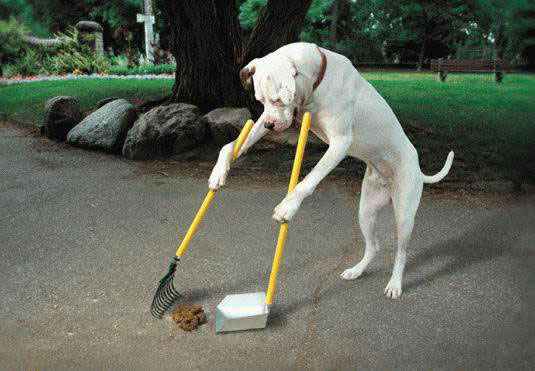
Pooper Scooper
One man’s poop is another man’s profit, and when there’s a poop problem, there’s someone willing to solve that problem, for a fee.
One of the hottest business opportunities around these days is starting a Doggie Pooper Scooper service. Just a quick check on how many pooper scooper related searches google has (a good way to see how many people are looking for solutions) shows there are over 191,000 page results dedicated to scooping poop, and 246,000 dog poop searches per month.
That’s a lot of poop!
So, besides being a lucrative business opportunity (low start up costs, no need for a college degree, and apparently a lot of people willing to pay someone else to scoop their dog’s poop), this segment of the business world seems to be a gold “mine” in more ways than one.
For example:
Missouri pooper scooper finds $58 in doggie doo
Missouri pooper scooper finds $58 in doggie doo. Posted by Woosk on Friday, June 25th 2010. 25. Jun. In this photo provided by DoodyCalls Pet Waste Removal, Steve Wilson, a worker with DoodyCalls Pet Waste Removal holds a plastic bag of …
Scoopers even have a week dedicated to educating pet owners as you can see here:
Pooper Scooper Week Starts Today
Special week of educating pet owners on importance of cleaning up after their dogs.
Their very own association:
The Association of Professional Animal Waste Specialists (aPaws)
And in Colorado scooping poop is a bright “spot” in an otherwise dismal economic climate.
Despite Economy Denver Pooper Scooper Turns Land Mines into Gold Mines
Pet Scoop, “Colorado’s Preferred Pooper Scooper” business is actually expanding. The privately-owned company is doing quite well in the economy, despite the current economic downturn. PET SCOOP is picking up…literally. …
So my question for you is:
Have you ever used a pooper scooper service? If so, what did you think about it?
![]()
Editor – Daily Paws
www.vetlocator.com